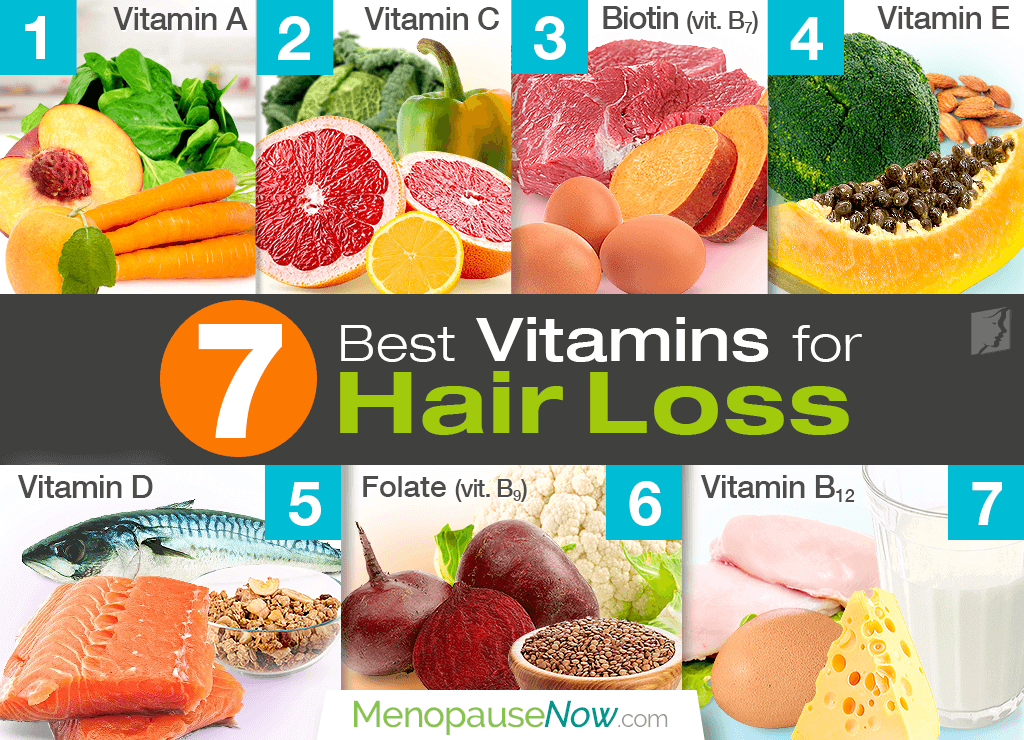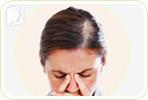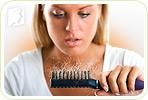While women typically associate hair loss with aging and menopause, many might not realize what a huge role proper nutrition plays in their hair health. Fortunately, loading up on wholesome foods rich in vitamins for hair loss in women can nourish the body and help prevent and manage the problem more effectively.
Keep reading to discover the best hair loss vitamins for women to restore your hair's youthful look and strength.
Vitamin A
The scalp uses vitamin A to create sebum, which is the oil that lubricates the hair roots and prevents them from drying out.1 However, caution should be practiced to avoid over-consumption as it can have adverse effects. Natural sources of vitamin A include spinach, carrots, apricots, and peaches.
Vitamin C
Vitamin C, or ascorbic acid, is not only a strong antioxidant, but it also plays an important role in red blood cell and collagen production, which promotes healthy hair. It is also important for proper iron absorption, especially in women whose hair loss is due to iron deficiency.2 Find vitamin C in citrus fruits, green peppers, and cabbage.
Biotin
Biotin, or vitamin B7, is one of the most popular female hair loss vitamins as its deficiency is known to cause hair problems. While scientific studies are scarce, the vitamin has shown to strengthen hair follicles and improve hair growth.3 Biotin is easily found in various food sources, like eggs, meat, nuts, and sweet potatoes.
Vitamin E
Studies have shown that vitamin E's antioxidant potential can reduce oxidative stress in the scalp, improve circulation, increase hair growth, and restore its shine.4 Food sources of vitamin E include almonds, broccoli, sunflower seeds, and papaya.
Vitamin D
Vitamin D is necessary for creating new follicles and stimulating hair growth. It is also needed for adequate calcium absorption, a mineral that is essential for maintaining strong and healthy hair, among other functions.5 Vitamin D can be consumed in salmon, mackerel, or fortified cereal as well as obtained from sun exposure.
Folate
Folate, also known as vitamin B9, is mostly known for its benefits in preventing neural tube defects during pregnancy. However, folate deficiency has also been shown to cause hair loss and thinning.2 As such, opting for foods rich in the vitamin - such as beets, cauliflower, and lentils - can effectively resolve deficiencies and boost hair growth.
Vitamin B12
Vitamin B12 can also benefit hair health through its actions on cell metabolism and red blood formation. Its lacks have been commonly found in those suffering from hair loss and premature graying.2 The vitamin can be found in chicken, eggs, cheese, milk, and fish.
Conclusions
Because vitamin deficiencies are one of the leading causes of hair loss, maintaining a nutritious and well-balanced diet is of the utmost importance, especially for women going through the menopausal transition. Besides consuming the aforementioned vitamins for hair loss in women, it is also important to eat foods rich in beneficial minerals, like iron and zinc, and implement other effective hair loss treatments for optimal health and beauty for years to come!
Sources
- Cleveland Clinic. (2019). Is Biotin as Good as Advertised for Your Hair Loss? Retrieved January 28, 2020 from https://health.clevelandclinic.org/is-biotin-as-good-as-advertised-for-your-hair-loss/
- National Institutes of Health. (2014). Hair Loss. Retrieved September 1, 2014, from http://www.nlm.nih.gov/medlineplus/hairloss.html
- Office on Women's Health. (2008). Skin and Hair Health. In: The Healthy Woman: A Complete Guide for All Ages. Retrieved from http://www.womenshealth.gov/publications/our-publications/the-healthy-woman/skin_hair.pdf
- Park, S.Y. et al. (2013). Iron plays a certain role in patterned hair loss. Journal of Korean medical science, 28(6), 934-938. doi: 10.3346/jkms.2013.28.6.934
- Przeglad Menopauzalny. (2016). Nutrition of women with hair loss problem during the period of menopause. Retrieved January 28, 2020 from https://www.ncbi.nlm.nih.gov/pubmed/27095961
Footnotes:
- Biochimica et biophysica acta. (2012). Endogenous retinoids in the hair follicle and sebaceous gland. Retrieved January 28, 2020 from https://www.ncbi.nlm.nih.gov/pubmed/21914489/
- Dermatology and Therapy. (2019). The Role of Vitamins and Minerals in Hair Loss: A Review. Retrieved January 28, 2020 from https://www.ncbi.nlm.nih.gov/pmc/articles/PMC6380979/
- Skin Appendage Disorders. (2017). A Review of the Use of Biotin for Hair Loss. Retrieved January 28, 2020 from https://www.karger.com/Article/FullText/462981
- Tropical Life Scientific Research. (2010). Effects of Tocotrienol Supplementation on Hair Growth in Human Volunteers. Retrieved January 28, 2020 from https://www.ncbi.nlm.nih.gov/pmc/articles/PMC3819075/
- Annals of Dermatology. (2012). Successful Treatment of Alopecia Areata with Topical Calcipotriol. Retrieved January 28, 2020 from https://www.ncbi.nlm.nih.gov/pmc/articles/PMC3412244/




